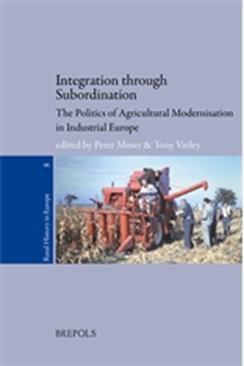Publications | Rural History in Europe
Integration through Subordination. The politics of Agricultural Modernisation in Industrial Europe
Starting from the hypothesis that states were crucial as agents of modernisation, this book explores why, how and with what results European states have striven to transform their agricultural sectors in the nineteenth and twentieth centuries. Modernising agriculture has increasingly meant emulating the new organisational models of manufacturing industry. But since agriculture continues to rely heavily on living resources (plants and animals), the results of modernising farming have often differed significantly from the manufacturing sector. Modernised agriculture, in other words, is something quite different than simply industrialised agriculture.
Ranging from the Iberian Peninsula to Hungary and from Greece to England, the chapters of this book deal with four principal questions: Why have state elites, and their civil society allies chosen to modernise agriculture? What have they understood by agricultural modernization ? What sort of power resources have they taken as necessary for effective modernisation? And what were the consequences of the pursuit of modernising policies for the farming population and for agriculture?
LIST OF CONTRIBUTORS
Paul BRASSLEY, University of Exeter, United Kingdom
Daniel FLÜCKIGER, Archives of Rural History/University of Bern, Switzerland
Dulce FREIRE, Universidade de Lisboa, Portugal
Fritz Georg VON GRAEVENITZ, European University Institute, Florence, Italy
Jonathan HARWOOD, University of Manchester, United Kingdom
Christian HOFFMANN, European Academy of Bozen/Bolzano, Italy
Niek KONING, Wageningen University, Netherlands
Daniel LANERO TÄBOAS, Universidade de Santiago de Compostela, Spain
Ernst LANGTHALER, Institute of Rural History, St. Pölten, Austria
Peter MOSER, Archives of Rural History, Bern, Switzerland
Socrates D. PETMEZAS Institute for Mediterranean Studies/FORTH and University of Crete, Rethymno, Greece
Kathrin RENNER, European Academy of Bozen/Bolzano, Italy
Flavio V. RUFFIN, Landesagentur für Umwelt, Autonome Provinz Bozen, Italy
Gloria SANZ LAFUENTE, Universidad Publica de Navarra, Spain
Serge SCHMITZ, University of Liege, Belgium
Anton SCHUURMAN, Wageningen University, Netherlands
Thomas STREIFENEDER, European Academy of Bozen/Bolzano, Italy
Zsuzsanna VARGA, Eötvös Loránd University, Hungary
Tony VARLEY, National University of Ireland, Galway
 Actualités
Actualités
Les intermédiaires dans la relation de travail dans les sociétés esclavagistes et post-esclavagistes, XVe siècle à nos jours
 Appel à communication - Samedi 1 mars 2025 - 18:00ArgumentaireDans la vaste question du travail contraint et forcé, les intermédiaires, placés à l’intersection des statuts de libre, d’esclave ou d’engagé, jouent un rôle central, quoique relativement négligé par l’historiographie. Ce numéro 'Esclavages & post~esclavages / Slaveries & Post~Slaveries (n°13, 2026, CIRESC), dirigé par Alessandro Stanziani (GRHEN), propose d’exposer leurs situations dans le long terme, du moment de la traite à cel(...)
Appel à communication - Samedi 1 mars 2025 - 18:00ArgumentaireDans la vaste question du travail contraint et forcé, les intermédiaires, placés à l’intersection des statuts de libre, d’esclave ou d’engagé, jouent un rôle central, quoique relativement négligé par l’historiographie. Ce numéro 'Esclavages & post~esclavages / Slaveries & Post~Slaveries (n°13, 2026, CIRESC), dirigé par Alessandro Stanziani (GRHEN), propose d’exposer leurs situations dans le long terme, du moment de la traite à cel(...)
Hugo Souza de Cursi, lauréat de la bourse d'aide à publication de l'IDA 2024
Prix et distinctions -L’ appel à publication de thèses lancé par l’Institut des Amériques (IDA) a vocation, chaque année, à attribuer une aide financière à de jeunes docteurs en sciences humaines et sociales dans le cadre de projets de publication de leur thèse. Les thèses récompensées abordent des thématiques en lien avec les Amériques.Parmi les trois projets retenus dans le cadre de l’appel lancé par l’IDA pour l’année 2024, et soumis à l’acceptation définitive des Presses universitaires d(...)
Prix de la pensée européenne 2024
Prix et distinctions -Le premier prix de la pensée européenne, créé par des intellectuels engagés, a été remis le 16 mars 2024 à Conques, dans l’Aveyron. L’objectif est de promouvoir un idéal démocratique européen qui réponde aux enjeux environnementaux et sociaux du monde.Associé à un colloque de fond "Le réveil de la pensée européenne ?" qui sest déroulé les 16 et 17 mars au Centre européen de Conques (retransmis en direct avec Philosophie Magazine), et présidé par le philosophe Dominique(...)
ERHIMOR
EHESS-CRH
54 boulevard Raspail
75006 Paris
Tél. : +33 (0)1 49 54 24 42
ou : +33 (0)1 49 54 25 74
Fax : +33(0)1 49 54 23 99
Dernière modification :
18/04/2018



